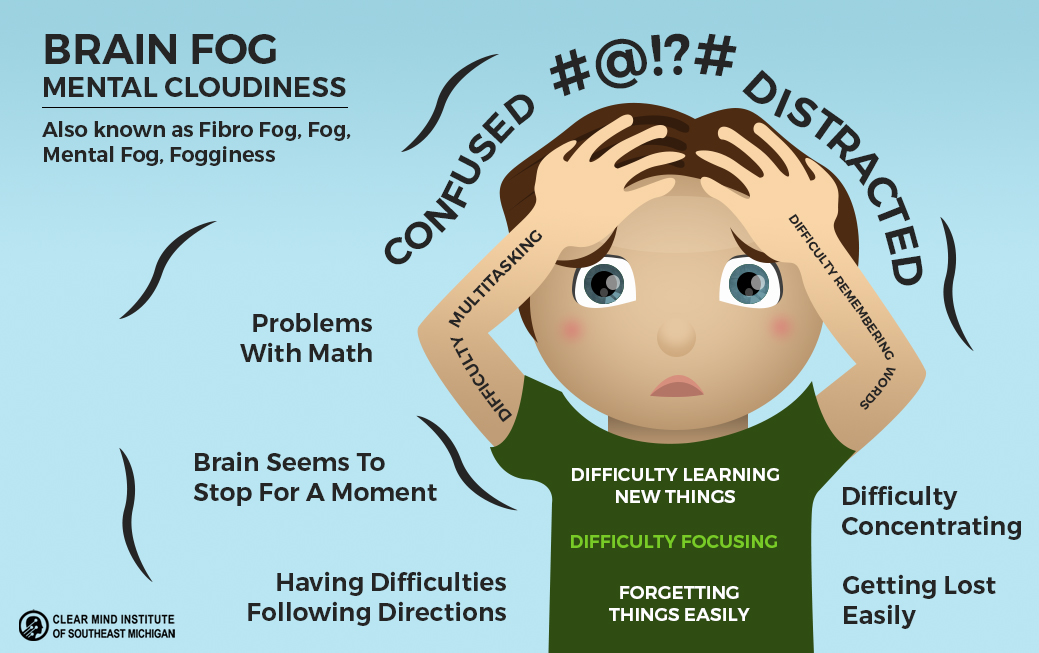Brain Fog (BF)

Brain Fog
Brain fog (BF) is a term commonly used to describe a range of cognitive impairments, including difficulties with concentration, memory, and mental clarity. It is not a medical condition but rather a symptom that can be associated with various underlying health issues. Individuals experiencing brain fog often report feelings of confusion, forgetfulness, and a lack of focus.
Causes of Brain Fog
- Fluctuations in hormones, particularly during menopause or due to thyroid dysfunction, can contribute to cognitive difficulties.
Chronic Stress:
- Prolonged stress can lead to elevated cortisol levels, which may impair cognitive function and memory.
Sleep Disorders:
- Insufficient sleep or conditions such as sleep apnea can significantly affect cognitive performance and lead to feelings of fatigue and confusion.
Nutritional Deficiencies:
- Deficiencies in essential nutrients such as vitamin B12, vitamin D, omega-3 fatty acids, and iron can impact brain health and function.
Medical Conditions:
- Conditions such as fibromyalgia, chronic fatigue syndrome, autoimmune diseases, and depression can manifest as brain fog.
Medications:
- Certain medications, including sedatives and some antihistamines, may cause cognitive side effects leading to brain fog.
Dehydration:
- Inadequate fluid intake can lead to dehydration, which affects concentration and cognitive abilities.
Symptoms of Brain Fog
- Difficulty concentrating or focusing
- Forgetfulness or memory lapses
- Mental fatigue or exhaustion
- Confusion or disorientation
- Reduced motivation or mental clarity
- Difficulty processing information
Management Strategies
- Implementing stress management techniques such as mindfulness meditation, yoga, or deep-breathing exercises can help reduce stress levels.
- Ensuring adequate sleep hygiene practices to improve sleep quality.
Nutritional Support:
- Eating a balanced diet rich in whole foods, including fruits, vegetables, whole grains, lean proteins, and healthy fats.
- Considering supplementation for any identified nutritional deficiencies after consulting with a healthcare provider.
Hydration:
- Maintaining proper hydration by drinking sufficient water throughout the day.
Regular Exercise:
- Engaging in regular physical activity can enhance blood flow to the brain and improve overall cognitive function.
Cognitive Training:
- Participating in activities that challenge the brain, such as puzzles or memory games, can help improve cognitive function over time.
Professional Support:
- Consulting with healthcare providers for a comprehensive evaluation to identify underlying causes of brain fog and appropriate treatment options.
Conclusion
Brain fog is a multifaceted symptom that can significantly impact daily life and overall well-being. Understanding its potential causes and implementing effective management strategies can help individuals regain mental clarity and improve cognitive function. At DrStemCellsThailand‘s Anti-Aging and Regenerative Medicine Center of Thailand, we focus on holistic approaches that include lifestyle modifications and personalized care strategies aimed at enhancing cognitive health.
For more information about our services or to schedule a consultation, please visit our website or contact our team directly.
Consult with Our Team of Experts Now!
References
- Understanding Brain Fog: Causes and Solutions
This article discusses the various causes of brain fog and offers strategies for management.
DOI: 10.1016/j.jdiacomp.2020.107646 - The Impact of Stress on Cognitive Function
This review highlights how chronic stress affects cognitive performance and contributes to symptoms like brain fog.
DOI: 10.1016/j.stemcr.2021.05.005 - Nutritional Deficiencies and Cognitive Health
This study evaluates the relationship between nutritional deficiencies and cognitive impairment.
DOI: 10.1016/j.biopsych.2018.03.006















